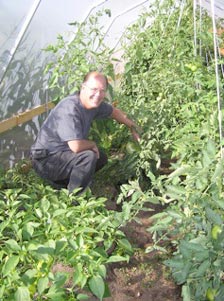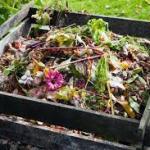 I believe that incorporating sacred spaces within the garden is also an essential part of this initial discussion. Depending on the size of the garden, places for people to sit and meditate, prayer paths, community gathering spaces, and even the inclusion of a labyrinth are all possible ways to strengthen peoples' faith beyond the activities associated with food production. Early monastic communities created walled gardens that were rich with biblical imagery, often centered around an apple tree, representing both the tree of Life in Genesis and the Cross of Christ.
I believe that incorporating sacred spaces within the garden is also an essential part of this initial discussion. Depending on the size of the garden, places for people to sit and meditate, prayer paths, community gathering spaces, and even the inclusion of a labyrinth are all possible ways to strengthen peoples' faith beyond the activities associated with food production. Early monastic communities created walled gardens that were rich with biblical imagery, often centered around an apple tree, representing both the tree of Life in Genesis and the Cross of Christ.
Establishing these connections between our faith and the garden are essential. In fact, I am concerned that this faith-based community garden movement may not be sustainable unless we learn how to connect our newfound passions to our understanding of God and God's world.
Once the basic garden plan has been moved through the appropriate church organizational process, it is usually fairly easy to recruit additional help, money, and in-kind donations. Every Sunday after the 10:30 am service, parishioners at St Mary's in Cadillac, Michigan, take turns weeding and tending the community garden. Other churches have recruited their youth groups and retirees as volunteers or asked for donations like soil and building materials from businesses owned by church members.
Those outside the church may be interested in being involved too. Sonlight Community Christian Reformed Church in Lynden went door to door asking neighbors if they would like to participate. The Pumpkin Patch Community Garden at Millwood Presbyterian Church in Spokane, WA used Facebook and Twitter to help get the word out and even had a Twitter-inspired flash mob at their first big work day this year. Or you might contact other environmental organizations that work in the area that may be interested in partnering with your efforts. Third Christian Reformed Church in Lynden partnered with AROCHA to develop a show garden that grows new and different varieties, provides teaching to other potential community gardeners, and hands out food to neighbors.
 You may also consider approaching your local Master Gardener's association, which is usually more than willing to provide expert advice if not labor and skills. Local high school or community college students may also be interested in volunteering as a way to earn their required Service Learning credits.
You may also consider approaching your local Master Gardener's association, which is usually more than willing to provide expert advice if not labor and skills. Local high school or community college students may also be interested in volunteering as a way to earn their required Service Learning credits.
Another important discussion for your planning group concerns the use of your garden produce. Many churches designate all or part of their harvest to local food banks and other organizations that feed the marginalized. For example, Grace Church in Old Saybrook, CT gardens a quarter-acre of land and donates its produce to the local Shoreline Soup Kitchens and Pantries, helping to feed 1,200 needy families. Other churches distribute the food amongst church members or invite neighbors to freely harvest from the garden.
Community gardens can also form the basis for other church related activities. Classes in gardening, cooking, and preserving can arise out of garden related activities. Other classes on health and nutrition, healing the earth and other environmental issues, and even spiritual formation can have their origins in such endeavors. My own venture into conducting seminars on The Spirituality of Gardening grew out of constant prodding from friends who wanted to learn more about not just how to grow vegetables but also about how to connect their experiences to their faith.
Montgomery Victory Gardens in Silver Spring, MD offers the following great advice for anyone contemplating starting a faith-based community garden:
Start with a small group of committed individuals, but work hard to involve the entire congregation in some way; look for ways to make the process educational, and to make connections to your faith tradition; enlist people, especially young people from the community outside the congregation; start small and do realistic planning, especially when it comes to people's crops in the beginning; keep a garden log and update the congregation throughout the process; expect surprises and have fun.




